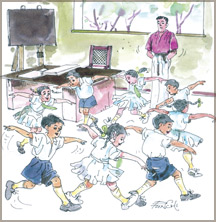|
DAILY NEWS ONLINE |
|
|
|
OTHER EDITIONS |
|
|
|
OTHER LINKS |
 |
 The first lesson, and ...'A bird came hop, hop, hop And another bird came "Is that all?" "That's all, that's all" she sang As I sang the little poem to the lovely children of my new class - Grade four - I acted out parts of it. I asked them to listen to the sound and sing with me. Most of them did. A few times more and the whole class was singing it - and I was delighted. I got them to stand and come 'hoppity-hop' round the class and sit on a chair. After they got used to the sound and the rhythm of the poem, I explained the little poem as best as I could and I dwelt on the exit line, so to say - "Is that all...? That's all! That's all!" and we had great fun. Class of birdsSome of the other teachers had stopped - more or less on their tracks - and they were openly gaping at the new Ingirisi Mahattaya and his class of birds! I managed a wink and a small wave towards Mr. Wijesuriya and he winked and waved back, being the jolly man he was.
Perhaps we were making a little too much noise for a small school and there was more laughter as I raised a 'hush-finger' to my lips and asked the class to play down their voices. This time it was even funnier - the birds trying to hush their 'Chirrupy-chirp! chirrupu-chirp!' All in all my first English lesson was a success - a little baffling success, if you like. Later that morning, when we were having tea at the Head Master's room, Mr. Wickramasinghe, the Head Master asked me with a hint of sarcasm, perhaps, whether teaching English always meant so much noise. "No sir, it's only on the first day.." I assured him. "Just to get a little attention from the children." "You got the attention of the whole school!" Mr. W. replied laughing - his gold tooth glistening from his dentures. From the 'Little Bird' I went on to more conventional rhymes such as 'Twinkle twinkle little star', the Pied Piper etc. as time went by. If there was sunshine outside, I would take the whole class out, under my 'baby sized' Jak tree where we could make a little more noise and act out part of the rhymes. Sometimes I would relate a little story from our own folklore,. like Mahadena Mutta or Andare in the simplest language possible and break into Sinhala if the going was too rough. Sound and rhythmI too learnt as I went along. I found that children were not afraid of sound or rhythm. They were a little scared of reading and writing, meaning letters. I introduced letters gradually and writing according to the little experience and capability of each child. As sounds and shapes stuck in they were quick to learn the meaning. The subject was relatively new (There had not been an English Asst. in this school for quite some time, until I came along) and when they found song and rhythm in it, the children grabbed it with their minds. They would often descend the steps after school humming 'Twinkle twinkle' 'piping down the valleys wild' or their favourite still - 'chirrupy-chirp'. It was not uncommon for children to be singing my songs even while bathing at the village spout! There were no bathing wells in Dehipe - ALL - men, women, children, bathed at the spout and what a refreshing bath that was! Mr. and Mrs. Ratnayake, my hosts were very kind to me and they always tried to prepare something extra for me. A particular preparation I came to love was their 'wattakka dalu melluma' which I had never tasted before and which I never got tired of. Mr. Ratanayke was called 'Liyana Mahattaya' because he acted as a kind of secretary for a bus company in Kandy. This took him to Kandy often and occasionally (perhaps on pay-day) he would bring a bottle of arrack and invite me too for a drink. Unfortunately or fortunately, I was not an imbiber at that time and Mr. R. would genuinely look hurt when I refused his invitation for a drink. One day he had brought a bottle of beer, but I was a teetotaller and non-smoker at that time. Mr. R. may have forgotten the fact that I was just 19 years old. I got on to these 'evils' (or pleasures?) much later in life, at the age of 26 or so after I got into films, but that's another story. I was becoming more and more aware that most children did not have even the basic necessities - such as textbooks, exercise books, pencils and even slates and slate-pencils. It was more or less by accident I found out how badly off some of the kids were. I have already spoken about the tea-interval in the school. Actually it was more a bun-interval. At around 10.00 in the morning, the buns were delivered to the school and each child was given a small bun (the elongated 'viskirinna' like kind) to eat. Noticed that most of the smaller children left the school after receiving the bun. In any case there were quite a few small children who came to school with a brother or a sister and they did not belong to any particular class - not even grade one. 'Bun operations'"Why do these children leave the school during the interval? Why are they allowed to do so?" I asked Mr. Anthony one day. He was in charge of all these 'bun operations'. In fact he was in charge of all welfare activities of the school. He looked at me as if I had asked a silly question. "Ingirisi Mahattaya", he replied rather wearily. "These children come to school for the bun. You would have noticed they don't belong to any class in the school. We don't object because we can afford a few more buns from our allocation." "But then, why do they leave after receiving the bun?" I insisted Mr. Anthony looked at me as if I had asked a sillier question. "They leave because they share the bun with a smaller brother or sister, Ingirisi Mahattaya...!" I felt ashamed at my ignorance and my insensitivity. Later I noticed that while a few of those kids ate the bun, most of them wrapped it in a piece of paper and carried it away. This conversation and the new awareness made me think. It made me think deeply. I could not give buns to the children. But perhaps I could help them in some other way so that they would have books, pencils, slates and slate pencils and other essentials. The three of us - Mr. Anthony, Mr. Pelis and I - used to go up to Padiyapelella town on Saturdays for various requirements. The two of them would buy their provisions (they shared the Head Master's quarters) and I would buy my stamps and envelopes etc. One Saturday morning we were walking back after one such visit and I broached the subject to them. "Mr. Anthony, Mr. Pelis, let's do a play for the children, to help them." Both of them stopped walking, stood on the tarred road and looked at me with utter disbelief. Thought of the weekThis week it's about garbage. Actually it has been garbage not for weeks but for months on end. Why cannot the authorities - whether they be the Colombo Municipal Council or the many provincial or Pradeshiya Councils - solve this problem by installing a sufficient amount of incinerators? Or, perhaps, a big master-incinerator? In the good old days garbage was not dumped by road sides, other people's gardens or at some stinking dumping ground. Garbage could be separated into three categories. Items such as glass, plate, tins and paper that could be recycled. Polythene, regiform and other items that could be recycled or destroyed and kitchen refuse and other such refuse that could be turned into compost. The last, at least would provide a certain amount of employment opportunities. Even 50 years ago there was garbage. They had adequate disposal methods then, such a incinerators. We are far more advanced today and we have far more garbage too. Do we just keep on dumping them in stinking heaps or do we take some meaningful steps? .................................. |
|
|
|
|||
|
|
|||
 |
|||
 |
|||
 |
|||
 |
|||

